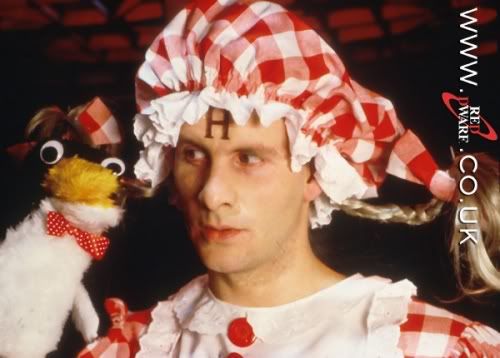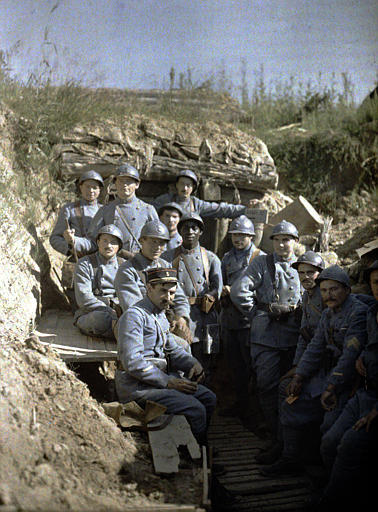http://monopolizten.stumbleupon.com/

Please give a warm Stumbleupon welcome to Monopolizten. A ‘legendary nerd’ who knows his Stenhousemuir from his Elgin City.

http://monopolizten.stumbleupon.com/

Please give a warm Stumbleupon welcome to Monopolizten. A ‘legendary nerd’ who knows his Stenhousemuir from his Elgin City.

From Truman’s farewell address to the nation:
“The greatest part of the President’s job is to make decisions–big ones and small ones, dozens of them almost every day. The papers may circulate around the Government for a while but they finally reach this desk. And then, there’s no place else for them to go.
The President–whoever he is–has to decide.
He can’t pass the buck to anybody.
No one else can do the deciding for him.
That’s his job.”
http://homepage.mac.com/geoduck/Art/Art.html
“You have never been in love,
Until you’ve seen the stars,
reflect in the reservoirs.”
http://clovia.stumbleupon.com/
Sad news, so I plaguarise WB Yeats:
“Clovia has sailed into his rest;
Savage indignation there
Cannot lacerate his breast.
Imitate him if you dare,
World-besotted traveller; he
Served human liberty.

Clovia – a visual feast, every visit.

He knows when your are sleeping,
He knows when you’re on the can,
He’ll hunt you down and blast your ass from here to Pakistan.
Ohh,
You better not breathe, you better not move,
You’re better off dead, I’m telling you, dude.
Santa Claus is gunning you down!
http://www.knowth.com/winter-solstice.htm

Chapter 24
(Barrett)
A movement is accomplished in six stages
And the seventh brings return.
The seven is the number of the young light
It forms when darkness is increased by one.
Change returns success
Going and coming without error.
Action brings good fortune.
Sunset.
The time is with the month of winter solstice
When the change is due to come.
Thunder in the other course of heaven.
Things cannot be destroyed once and for all.
Change returns success
Going and coming without error.
Action brings good fortune.
Sunset, sunrise.
http://www.old-picture.com/europe/Yorkshire-Whitby-Hoods-Robin.htm

Robin Hoods Bay, Whitby, Yorkshire.
This colour photochrome print was taken between 1890 and 1900.
http://en.wikipedia.org/wiki/Chinese_River_Dolphin

Lipotes vexillifer
The Chinese River Dolphin, last sighted in 2004, it was recently declared “with all probability extinct”
http://news.xinhuanet.com/english/2006-12/13/content_5479583.htm

“A souvenir stamp and coin collection of Peking Opera star Mei Lanfang on stage will be released on December 20, the biggest event to commemorate his memory.
The collection is composed of 11 gold and silver coins, 64 stamps and eight exquisite telephone cards. They will feature ten pictures of the star before his death. Two of the pictures have never been seen by the public before.
The pictures show Mei Lanfang in classic Peking Opera poses. Together, they represent some of the milestone moments in the history of the opera.
The ten photos will be used exclusively in the special collection. “
http://canhistory.blogspot.com/

“The Americans are coming!”
Laura Secord (1775 – 1868) was a Canadian heroine of the War of 1812.
“She was a pioneer and a mother of five whose husband had been wounded and left for dead during the Battle of Queenston Heights. Laura had gone to the battlefield, found him, and taken him home. She was nursing her husband back to health when the Americans arrived and took command of the Secord homestead.
Laura overheard the officers discussing their plans for a surprise attack at Beaver Dams, and the following morning she set off on an epic 32-kilometre trek across the war zone to warn the British. When she finally climbed the Niagara Escarpment, her feet were bleeding and night had fallen. Mohawk sentries took her to see Lieutenant James FitzGibbon. Tipped off by Laura Secord, FitzGibbon set up an ambush at Beaver Dams (now Thorold, Ontario) on June 24, 1813. The Mohawk war cries frightened the Americans into surrender, and FitzGibbon and his men took almost 500 Americans prisoner, including the commander. “Not a shot was fired on our side by any but the Indians,” wrote FitzGibbon, approvingly. “They beat the American attachment into a state of terror.” At Stoney Creek, two weeks earlier, the American invasion had been stopped.
At Beaver Dams it was turned back.”
Many thanks to:
http://lgsquirrel.stumbleupon.com/
for finding this site.
http://nukingbabyjesus.cf.huffingtonpost.com/
Amusing Flash animation / promo vid of ‘We Three Kings’ taken from the album ‘An Imaginary Christmas’ by the ‘Imaginary Trio’ who are in reality one man and his computer.
http://www.poetryloverspage.com/poets/kipling/kipling_ind.html

Tommy
By Rudyard Kipling
I went into a public-‘ouse to get a pint o’ beer,
The publican ‘e up an’ sez, “We serve no red-coats here.”
The girls be’ind the bar they laughed an’ giggled fit to die,
I outs into the street again an’ to myself sez I:
O it’s Tommy this, an’ Tommy that, an’ “Tommy, go away”;
But it’s “Thank you, Mister Atkins”, when the band begins to play,
The band begins to play, my boys, the band begins to play,
O it’s “Thank you, Mister Atkins”, when the band begins to play.
I went into a theatre as sober as could be,
They gave a drunk civilian room, but ‘adn’t none for me;
They sent me to the gallery or round the music-‘alls,
But when it comes to fightin’, Lord! they’ll shove me in the stalls!
For it’s Tommy this, an’ Tommy that, an’ “Tommy, wait outside”;
But it’s “Special train for Atkins” when the trooper’s on the tide,
The troopship’s on the tide, my boys, the troopship’s on the tide,
O it’s “Special train for Atkins” when the trooper’s on the tide.
Yes, makin’ mock o’ uniforms that guard you while you sleep
Is cheaper than them uniforms, an’ they’re starvation cheap;
An’ hustlin’ drunken soldiers when they’re goin’ large a bit
Is five times better business than paradin’ in full kit.
Then it’s Tommy this, an’ Tommy that, an’ “Tommy, ‘ow’s yer soul?”
But it’s “Thin red line of ‘eroes” when the drums begin to roll,
The drums begin to roll, my boys, the drums begin to roll,
O it’s “Thin red line of ‘eroes” when the drums begin to roll.
We aren’t no thin red ‘eroes, nor we aren’t no blackguards too,
But single men in barricks, most remarkable like you;
An’ if sometimes our conduck isn’t all your fancy paints,
Why, single men in barricks don’t grow into plaster saints;
While it’s Tommy this, an’ Tommy that, an’ “Tommy, fall be’ind”,
But it’s “Please to walk in front, sir”, when there’s trouble in the wind,
There’s trouble in the wind, my boys, there’s trouble in the wind,
O it’s “Please to walk in front, sir”, when there’s trouble in the wind.
You talk o’ better food for us, an’ schools, an’ fires, an’ all:
We’ll wait for extry rations if you treat us rational.
Don’t mess about the cook-room slops, but prove it to our face
The Widow’s Uniform is not the soldier-man’s disgrace.
For it’s Tommy this, an’ Tommy that, an’ “Chuck him out, the brute!”
But it’s “Saviour of ‘is country” when the guns begin to shoot;
An’ it’s Tommy this, an’ Tommy that, an’ anything you please;
An’ Tommy ain’t a bloomin’ fool — you bet that Tommy sees!
see also:
http://www.telegraph.co.uk/opinion/main.jhtml;jsessionid=2STDV05HUU1ONQFIQMFCFF4AVCBQYIV0?xml=/opinion/2006/12/09/do0901.xml

“Let me get this straight.
You want to fly on a magic carpet to see the King of the Potato people and plead for you freedom and you’re trying to tell me you’re completely sane?
Oh, Mr. Flibble is very cross,”
What should we do with them Mr. Flibble?
We can’t possibly do that!
Who’d clear up the mess?
http://www.network54.com/Forum/211833/thread/1088370788/


Rare colour photographs of French soldiers serving in the Great War (1914 – 1918)

THE BALLAD OF THE WOGGLER’S MOOLY*
(Kenneth Williams)
Joe, he was a young cordwangler,
Munging greebles he did go,
And he loved a bogler’s daughter
By the name of Chiswick Flo.
Vain she was and like a grusset
Though her gander parts were fine,
But she sneered at his cordwangle
As it hung upon the line.
So he stole a woggler’s mooly
For to make a wedding ring,
But the Bow Street Runners caught him
And the judge said “He will swing.”
Oh, they hung him by the postern,
Nailed his mooly to the fence
For to warn all young cordwanglers
That it was a grave offence.
There’s a moral to this story,
Though your cordwangle be poor,
Keep your hands off other’s moolies,
For it is against the law.
*A mooly is a sort of smoked cuttlefish of the whelk family, or a brother-in-law you might say.
Nowadays you can get them frozen and pre-woggled, but they don’t taste the same.
Hear All, See All, Say Nowt
Recorded by Sandy Powell 1939
Hear all, see all, say nowt,
Eat all, drink all, pay nowt.
It’s a long time remember
from January to December
So hear all, see all, say nowt,
Eat all, sup all, pay nowt
And if ever thy does owt fer nowt
Always do it fer th’sen.
When I was a right young lad
Me father said t’me
Seems to me thy’s growin’ up
Now what’s thy goin’ t’be?
It all depends upon th’self
It’s only up to thee
I won’t say much to you again
But take this tip from me…
Hear all, see all, say nowt,
Eat all, drink all, pay nowt.
It’s a long time remember
from January to December
So hear all, see all, say nowt,
Eat all, sup all, pay nowt
And if ever thy does owt fer nowt
Always do it fer th’sen.
Save thy pennies while thy can
And just do what I say,
If thy doesn’t keep thy ‘ead
Tha’ll ‘ave some brass one day.
It all depends upon th’self
It’s only up to thee
But there’s one thing thy can reckon on
Thy won’t get owt from me.
http://www.nlm.nih.gov/hmd/chineseposters/index.html

The ear is like a telephone and the eye is like a camera.1933.
“This online exhibition was created from Dr. Liping Bu’s presentation, titled “Public Health and Chinese Society from 1930s to SARS,” at Seminar in the History of Medicine, National Library of Medicine, August 15, 2006. Dr. Bu is professor of history at Alma College and is working on a book about Public Health and Modernization of China.”
Click here:
http://www.nlm.nih.gov/hmd/chineseposters/images/1200/DSC_4004.jpg
for a larger image.
http://www.iisg.nl/exhibitions/chairman/chn76.php

We should do more and engage less in empty talk – Deng Xiaoping
This pronouncement is illustrated with a photograph of a modern cityscape. Note the cars pasted in: not all of them follow the direction of traffic.
Deng, born in 1904, joined the Communist Party in 1924 and held high offices until he was expelled at the start of the Cultural Revolution. In 1973 he made a comeback, only to be expelled again in 1976.
In 1977 Deng returned for the second time and became the most important man in the Party after the brief interlude of Hua Guofeng.
He died in February 1997.